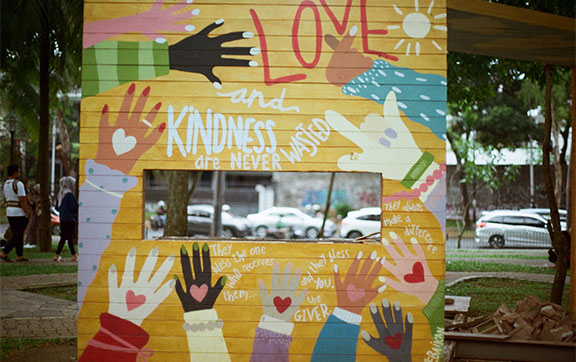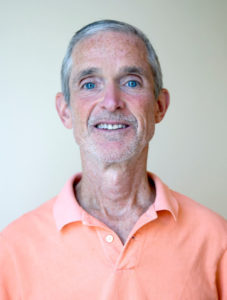
Photo by Ditto Bowo on Unsplash
Loving-kindness is probably known to many as the Buddhist practice of metta, The formal practice of metta begins beautifully, by directing kindness toward ourselves or to someone to whom we can easily feel goodwill. Once we take a moment to actually feel that energy of genuine care in the heart, we can practice dwelling on it and gradually learn to expand it outward, regardless of how much we like or dislike someone or something.
We are often so preoccupied with our own ideas and plans that we fail to consider the needs of others. Though the underlying motive for our efforts may be our own happiness, this pursuit can be lonely and fruitless if it obstructs the natural flow of love in our hearts. Who can really find happiness by ignoring, or even harming, someone else? In doing so, we unknowingly rob ourselves of the very happiness we seek.
Swami Satchidananda’s words remind us that our natural inner joy is more clearly recognized and experienced when we think of others: “Don’t ever think that you get joy by giving. When you do everything as a dedicated act for the benefit of humanity, not just for your benefit, you retain your joy.”
The Buddhist practice of metta begins beautifully by directing loving-kindness and compassion toward ourselves or to someone to whom we easily feel goodwill. When we take a moment to actually feel that energy of genuine care in the heart, we can practice dwelling on it and gradually learn to expand it.
A simple way to direct this intention to ourselves is with the body. For example, when we practice asanas, we can respond to the messages of the body as it is, instead of imposing on it how we would like it to be. We can practice nourishing the body with proper rest and healthy food.
Then we can develop that same accepting awareness toward our minds, witnessing its moods and desires without judgment, and without getting swept away by them. For example, when I see how attached I am to my own plan that conflicts with someone else’s, I can observe how that struggle to control things creates tension.
Whenever we see the cause of our suffering clearly, or how our attachment closes our hearts to others, we can choose to let go. We can value the benefit of an open, loving heart instead of getting our own way. There are endless ways to practice loving-kindness with others in our daily lives. Here are a few:
- When in conversation, we can listen with our full attention, instead of planning our response or jumping in with our comments.
- When we encounter a store clerk, bus driver, or neighbor, we can be present to them with respect and care.
- When we disagree with someone, we can practice opening our minds to another point of view that may have equal merit to ours.
- When we observe the tendency to be critical or unforgiving, we can remember the ways we may have offended someone else during our own struggles, and can practice releasing ill-will, which only harms our own hearts.
Pema Chodron beautifully encapsulates this last practice when she writes in Start Where You Are, “The basic ground of compassionate action is the importance of working with . . . your own unwanted, unacceptable stuff, so that, when the unacceptable and unwanted appears out there, you relate to it based on having worked with loving-kindness for yourself.” This practice can ultimately be applied to almost anything we do by simply having a genuine concern for someone’s well-being in our hearts.
It is so inspiring for me to remember that I can make a difference in our world, one small interaction at a time. Each person’s efforts influence those around them and, ultimately, the collective consciousness of our planet. If more of us are willing to practice loving-kindness, these small steps can go a long way toward positive change. The first benefit happens in our own hearts—when they open to the natural movement of love that is meant to flow and connect us to all of life.
About the Author:
 Swami Ramananda is the president of the Integral Yoga Institute of San Francisco and a greatly respected master teacher in the Integral Yoga tradition, who has been practicing Yoga for more than 35 years. He offers practical methods for integrating the timeless teachings and practices of Yoga into daily life. He leads beginner, intermediate, and advanced-level Yoga Teacher Training programs in San Francisco and a variety of programs in many locations in the United States, Europe, and South America. Swami Ramananda trains Yoga teachers to carry Yoga into corporate, hospital, and medical settings and has taught mind/body wellness programs in many places. He is a founding board member of the Yoga Alliance, a national registry that supports and promotes Yoga teachers as professionals.
Swami Ramananda is the president of the Integral Yoga Institute of San Francisco and a greatly respected master teacher in the Integral Yoga tradition, who has been practicing Yoga for more than 35 years. He offers practical methods for integrating the timeless teachings and practices of Yoga into daily life. He leads beginner, intermediate, and advanced-level Yoga Teacher Training programs in San Francisco and a variety of programs in many locations in the United States, Europe, and South America. Swami Ramananda trains Yoga teachers to carry Yoga into corporate, hospital, and medical settings and has taught mind/body wellness programs in many places. He is a founding board member of the Yoga Alliance, a national registry that supports and promotes Yoga teachers as professionals.

